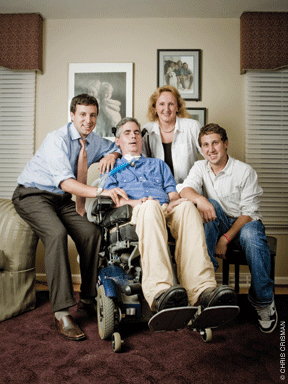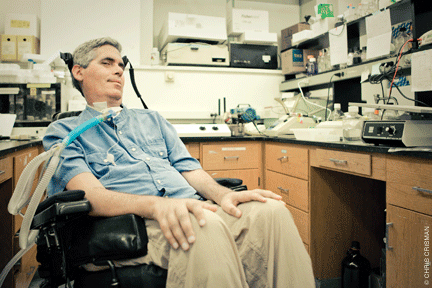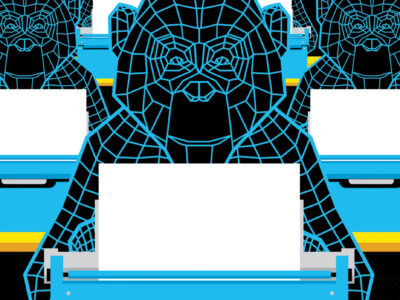
Thanks to advanced technology and the family, friends, colleagues, and caretakers who make up his “crew,” Penn neuroscientist and alumnus Scott Mackler continues to function professionally and personally a decade after being diagnosed with the lethal neurodegenerative disease ALS.
By Kathryn Levy Feldman | Photography by Chris Crisman C’03
In a laboratory on the ground floor of the John Morgan building, senior research investigator Laxminarayana Korutla and research lab technician Trevor Jackson C’07 are trying to determine how a protein in the brain known as NAC-1 interacts with other proteins in our system. In rats, NAC-1 plays a role in regulating addiction to cocaine—rats with more of the protein are less likely to become addicted, and vice versa. NAC-1 may also be an important genetic marker identifying susceptibility to addiction in humans.
To find out, researchers first isolated the protein and deleted the gene that causes the increased sensitization. Now they are trying, through trial and error, to determine how NAC-1 interacts with other genes. “It is theoretical, challenging, painstaking work that moves in incremental steps,” Korutla explains. “Every researcher builds upon the knowledge of others.”
The director of the lab—Scott Mackler C’80 PT’80 Gr’86 M’86, associate professor of medicine and psychiatry in the School of Medicine—first identified NAC-1 in 1996. That was three years before he officially learned he had Amyotrophic Lateral Sclerosis (ALS), also known as Lou Gehrig’s disease. The condition has since left him “locked in”—mentally alert but unable to move, speak, or breathe without a respirator.
In his darkened office just off the main floor of the lab (his eyes are sensitive to bright light), he reclines in his wheelchair, attended by his longtime assistant Dana Williams. Wearing a blue rubber cap fitted with electrodes that pick up his brainwaves, Mackler stares intently at a flashing computer screen that cycles between letters, numbers, and symbols that provide the equivalent of a standard computer keyboard. Taking advantage of a brain-based communication device known as a brain-computer interface (BCI), Mackler concentrates on the number of times the screen flashes to select a letter. When he does, it appears on another screen in the body of an email. In this way, thinking letter by letter, he types about six words a minute.
Like the researcher’s quest to understand NAC-1, this is slow, challenging, painstaking work that moves in incremental steps. But it is the lifeline that allows Scott Mackler to continue his research on cocaine addiction, to publish his findings, and to communicate with his family, friends, caretakers, and the world.
A decade after his devastating diagnosis, Mackler’s mind, untouched by the motor-neuron disease, is helping to sustain him. But it is not the only thing. Because as much as this is a story about brainpower, it is also a story about the power of love.

Back in the late 1990s, Scott Mackler spent his very full days caring for patients, conducting research, lecturing medical students and teaching residents at Penn’s School of Medicine. He was also a devoted husband to Lynn Snyder-Mackler PT’80 G’84 (currently a professor in the Department of Physical Therapy at the University of Delaware) and a hands-on father to their two sons Alexander Snyder-Mackler C’05 and Noah Snyder-Mackler C’07, now pursuing his doctorate at Penn. And he was a serious athlete—serious enough to run the Boston Marathon twice during his grueling, 100 hour/week residency training and to continue to make time, regardless of the demands of his practice and research, to run about six miles or to play tennis every day.
Then—it was in December of 1998, he recalls—he noticed that his tennis racquet had begun to slip out of his hand. His running times started to slow, and he started to experience involuntary contractions of the muscles in his right forearm. Also, he couldn’t tell a joke without laughing before the punchline.
Mackler knew that the twitching, loss of hand strength, and inability to control his outward emotions could be early indications of ALS. But to his surprise, the first neurologist he consulted dismissed his concerns. Frustrated, Mackler sought a second opinion and was tested for other diseases, including multiple sclerosis. Those tests were all negative, even as new symptoms appeared.
Mackler began slurring his words. At first, he could still keep that behavior in check if he concentrated on speaking slowly, but he could no longer disguise his inability to keep up with his lunchtime running buddies. He was sure he had ALS, regardless of what anyone else said—or didn’t say. “Even as my symptoms progressed, everyone continued to suggest other possibilities,” Mackler explains in the computer-generated voice that narrates the lecture, “The Physician as Patient,” that he now presents to first-year medical students. “Denial may be a wonderful ego-defense mechanism, but I was not able to enjoy it.”
Harvey Mackler W’75 doubts that denial would have ever have been part of his younger brother’s coping strategy. “My brother is a control freak with a fierce will to live,” he says. “Yet, he has always accepted the hand that has been dealt him.” According to Harvey, when Scott was definitively diagnosed, in May 1999, he read Elizabeth Kubler-Ross’ famous book, On Death and Dying, about the five stages of dealing with grief or tragedy—only he skipped over denial, anger, bargaining, and depression and went straight to acceptance. “He told me, ‘It is what it is,’ and he never looked back,” Harvey recalls.
What Scott accepted with such rare grace was the fact that a neurodegenerative disease would methodically paralyze the muscles of his limbs and trunk, as well as the ones that controlled his speech, his ability to swallow, and even his breathing—while leaving his senses, brain, and internal organs intact. A disease that struck for no known reason, was without cure, and which would inevitably progress, though according to no consistent timetable.
The ALS Association, an advocacy group, estimates that about 30,000 Americans have ALS. Some 5,600 people are diagnosed each year, which works out to 15 or so new cases per day. The average life expectancy is three to five years after diagnosis, although 10 percent live for more than a decade. Onset is generally between the ages of 40 and 70. Victims are somewhat more likely to be men (60 percent) and are overwhelmingly white (93 percent).
For Mackler, the thought of a life in which he would not be able to communicate or retain some sense of independence was even more devastating than living with the physical limitations that were equally unavoidable. Fully aware of what his future would hold and convinced he would not want to live on a ventilator, nine years ago he recorded a video for his two sons, which was broadcast as part of a 60 Minutes feature on him that first aired in November 2008.
In the video, Mackler (wearing a Penn T-shirt) takes a break from a run in the woods to basically say farewell to the boys he did not imagine he would see grow to adulthood. “I know the future holds lots of love and joy and pride and that life goes on,” he says to the camera. “I’ll be watching you along the way and I love you very much and I’ll see ya.”
Not long after Mackler recorded that video, he and his family took off to travel the world. By the end of 1999, when they had reached South Africa, Mackler needed a wheelchair to get around. “In my last two years of high school, he went from beating everyone running, to walking with arm crutches for a brief period of time, to eventually using a scooter, and then a wheelchair,” Alex recounted in a story that appeared in Philadelphia Weekly in 2005.
The progression of the disease was typical, according to Lynn. “Most patients are ventilator-dependent in two years,” she says. Far less typical has been the way that Scott, aided by technology and an extraordinary human support network, has continued to function professionally and personally. At the time of his diagnosis, no one, least of all Scott himself, imagined a future in which he would still be lecturing (via a computer-generated voice) five years later, or continuing to work and direct his laboratory another five years after that.
What has made the difference, Mackler told CBS correspondent Scott Pelley in the 60 Minutes interview, is the ability to communicate. Prior to the BCI system that he currently uses, Mackler had employed various eye-gazing techniques, in which users visually focus on letters or symbols on a computer screen, to communicate. He had also developed a family shorthand that is sometimes quicker than the computer—for those accustomed to using it. As his sister, Randi Mackler Windheim C’77, explains, “He moves his eyeball to look at you when you give him the correct letter.” The alphabet is divided into thirds, and the object is to break the word down, letter by letter, by naming each one until Scott approves the selection. Alex and Noah are particularly adept at flying through the alphabet and determining when their father is trying to talk. “Mom,” Alex reprimanded his mother when Lynn answered one of my questions for her husband. “Dad is talking.”

It was frustration with the slow speed and limited accuracy of the eye-gaze system that led Scott and Lynn to the Laboratory of Neural Injury and Repair at the Wadsworth Center in Albany, part of the New York State Department of Health, about five years ago. “My boss, who is a neuroscientist, actually found them,” says Lynn.
The BCI communication system that Scott uses was developed by a team led by Jonathan Wolpaw, an investigator and research physician at the center, based on a method first described by Emanuel Donchin, a professor emeritus of psychology at the University of Illinois at Urbana-Champaign. Scott was the first person in the country to use the device independently in his own home (there are now four others). When he first contacted the Wadsworth Center, the BCI was still in the developmental stages. “When he called a year later, we agreed it was time to try it out,” says Theresa Vaughan of Wadsworth’s BCI group. “Scott’s enthusiasm and level of commitment made him an ideal first candidate for the system.”
According to Alex, after a couple of weeks of use, his father told the researchers that if they let him keep the equipment, he would help them with their research. “It made such a huge difference in the quality of his life,” he says.
True to his word, Scott continues as Subject Number 1 in the Wadsworth Center’s ongoing BCI home studies. He generates data that the scientists at the center upload on a regular basis. In return, they provide technical support and routine maintenance.
According to Vaughan, Scott’s ongoing success with the system that he has used for over three years now has been critical. “We are about to take the BCI home-use research to another level, and some of that is related to Scott’s persistence,” she explains. “He was out there on the crest of the wave.” At press time, Wadsworth and the Veterans Administration were planning a five-site clinical trial of the BCI system for patients with ALS. In addition, together with the Wharton School’s Leonard Lodish, the Samuel R. Harrell Professor of Marketing (who has raised $725,000 for the ALS Association through annual long-distance bicycle rides with his wife), the Wadsworth group has established the Brain Communication Foundation, dedicated to supporting the widespread dissemination of BCI systems to people like Scott.
While technology has changed Scott’s life, the human support he receives is equally critical. “There are a lot of things that conspire to make this all work,” notes Lynn, who coordinates her husband’s around-the-clock care while maintaining her own professional caseload and teaching responsibilities. Her physical therapy students help with Scott’s care, and “one or more of them lives here,” she explains. In addition, there is Scott’s assistant, Dana Williams, a certified nursing assistant, who drives a specially equipped van from the Mackler home in Delaware to Penn’s campus every weekday morning except Friday, sets up Scott’s BCI system, answers his phone, monitors his ventilator, feeds him through his feeding tube, then turns around and takes him home at the end of the day. Dana, who has been doing the job for the past seven-and-a-half years, calls it “sweet” because she gets to spend her whole day with Scott.
At the time Lynn and Scott discovered the Wadsworth BCI, the Macklers’ live-in physical therapy student was one Jill Heathcock, who was engaged to a computer software programmer named Bob Cardillo. Eventually Bob moved in as well and became what Vaughan refers to as “the critical interface” between the technology and Scott.
Scott had already been using software that Cardillo helped write to control his computer via the eye-gaze system. Cardillo provided a similar interface with the BCI. This software, dubbed Brain Keys, enabled Mackler to operate the BCI almost the same way he had been operating the eye-gaze system, although with much more reliable results. “To select a letter, your brain sends out a signal similar to the one you use to hit a letter on a keyboard,” Cardillo explains. “Anything that a computer can control can be programmed using Brain Keys and the BCI.”
In fact, Cardillo rigged Scott’s system to be able to do more than just type emails. He designed an interface with a word-prediction program that makes it easier for Scott to compose documents. He also wired the television remote control, lights, and thermostat so that Scott is able to control all three. “One night, I was watching some chick-flick on television when all of a sudden the channel changed to ESPN,” laughs Lynn. “I looked over at Scott and he had a goofy grin on his face and he changed the channel back. How typically male that he could control the remote before he could control anything else!”

The beauty of all this technology, according to Lynn, is that once Scott is set up, he is “independent from the rest of us.” The Wadsworth BCI has not only enabled him to continue his work—directing research, writing grant proposals, and supervising funded grants—but to regain a piece of his dignity. “I hate being helpless and when other people put words in my mouth,” Mackler “told” Pelley.
Not that the Wadsworth BCI is perfect. “It is slow and an incredibly awkward way of communicating,” admits Vaughan. “Scott gets frustrated with it, as we do, and we are working on making it faster.” Using his eyes, it takes Scott about six months to write a grant application, of which 70 to 80 percent receive funding, according to his longtime research associate Korutla. Scott recently told Vaughan that he had just completed another one.
The Macklers are the first to admit their situation is rare, not only because of their access to quality caregivers from Lynn’s students, but also because of their financial situation. Since Scott is a participant in an ongoing feasibility study, Wadsworth provides him with the BCI system that normally costs about $5,000 free of charge. Scott’s generous health and disability insurance covers many of his expenses, and the National Institutes of Health, one of his major funders, makes additional funds available for investigators who develop disabilities. “NIH pays Dana as a disability supplement,” Scott reports via email. According to Harvey Mackler, it costs about $250,000 annually to keep a patient at Scott’s stage alive. “The amount of care-giving alone is absolutely staggering,” he elaborates. “I honestly don’t know how a normal family can do this.”
As a successful, two-career professional couple, the Macklers have ample personal resources, and Scott was reluctant to become a “poster child” for funding ALS research endeavors, believing that a cure was more likely to come from advances in basic science than from ALS-specific research. But he was also aware that his situation put him in a special position to help make the technology available to others. He has allowed himself to be “exploited,” as Harvey puts it, to raise funds for the Scott A. Mackler, M.D., Ph.D. Assistive Technology Program. The only one of its kind in the country, the program provides technological equipment to ALS patients to improve their quality of life. It loans out communication devices such as computers with voice output; control units for hands-free access to TVs, VCRs, and CD players; and remote door-chimes to call for help.
The chief vehicle for fundraising is the Scott Mackler 5K Run/Walk, held annually since 2000 with the help of the Temple Beth El community in Newark, Delaware, as well as Scott’s friends and his brother Harvey, who is president of GEMPIRE, a company that makes promotional jewelry and other products. The event attracts over 500 participants each year, including competitive runners and walkers from as far away as Florida, and has raised more than $1 million. Because of the program, says Lynn, “There has never been an ALS patient in the greater Philadelphia chapter’s area that has gone without communicative technology. We are very lucky that we are able to do this.”
Scott and Lynn are also quick to acknowledge that Penn has been very supportive of Scott’s situation. Perhaps most tellingly, Lynn adds, “They moved his lab from the VA to prime first-floor space in pharmacology, no questions asked.” The extended Mackler family has returned that loyalty in the most direct way, sending so many members to the University that when Scott’s sister Randi decided to celebrate Harvey Mackler’s 50th birthday by purchasing a “small” brick inscribed with all the family alumni’s names to be set into the Class of 1949 Generational Bridge, which takes Locust Walk across 38th Street, she was forced to get the largest size instead. “It was the combination of spelling out Alexander Snyder-Mackler C’05 and all of Scott’s degrees that put us over,” she laughs. “Now when Noah gets his PhD, we’ll have to get an ‘Etc.’ brick!”
Randi’s son, Justin Windheim C’03, used to help Scott navigate from the parking lot to his office in the early stages of his disease. In fact, everyone in the Mackler family is a card-carrying member of what they refer to as “Scott’s crew.” Both Alex and Noah have arranged to live nearby. Alex, who was Vice President Joe Biden’s press secretary when Biden was one of Delaware’s senators, is currently doing the same job for his replacement, Ted Kaufman WG’66. Noah is enrolled in Penn’s doctoral program in psychology, and except for sporadic field work in Ethiopia, is on campus and able to pop into his father’s lab. Randi, a reading specialist, lives in the Philadelphia suburbs, and every week their 81-year-old mother, Helen, drives herself the two-and-a-half hours from her home in North Jersey to cook, do the food shopping, and run errands for Lynn and Scott.
“We are in awe of Scott and what he continues to do,” Randi says. “He is still a highly valued, contributing member of society and as long as he knows he is making inroads in his work and is an integral member of the family, then he is going to keep on fighting.” Harvey puts it this way: “We have a family network that supports each other and supports him.”
The Macklers, who have learned to travel with “two of everything,” Lynn says, attend life-cycle celebrations of family and friends, frequent restaurants and movie theaters, and attend lots of sporting events. An avid Giants fan, Scott made it to five games last year in Giants Stadium. He was also thrilled that Phillies’ announcer Harry Kalas, who died suddenly this spring, was the emcee at the Philadelphia ALS Chapter’s annual luncheon last year, where Scott was the honored speaker.
Scott was in the faculty line-up on Locust Walk to salute each of his sons on their graduation days, celebrating his own 25th reunion when Alex graduated in 2005. In fact, the circle of love that surrounds Scott is as vital to his existence as the technology that enables him to communicate with everyone in it. And while he takes pride in his continued ability to work, it is secondary to, as he puts it, “the happiness of my family.”
“My brother has changed my life completely and made me reevaluate my priorities,” says Harvey, voicing a sentiment the others echo. “Inspiration does not begin to describe what Dad provides for us—not just for Noah and me, but for the entire community,” says Alex. “Watching him strive every day to lead a complete life against all odds makes our daily challenges seem like insignificant bumps in comparison. He and Mom are constant reminders of everything that is right about the world, the ultimate fighters who take every punch and are stronger for it.”
“Please don’t think that I’m an inspiration, because anyone could do what I’ve done,” was Scott’s final message, via PowerPoint, in the 60 Minutes interview. To which Pelley remarked, “I don’t particularly think that is true.”
“I don’t either,” Lynn added. “I think he’s pretty brave.”
Kathryn Levy Feldman LPS’09 wrote about the life and death of the courageous racehorse Barbaro for the Gazette back in 2007.




